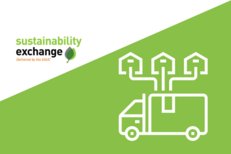Displaying 361–380
of 410 results | View 20
50
100
per page
-
Web Page
Case study of the University of Gloucestershire realizing that computer and printer procurement and usage was a significant contributor to the university’s environmental...
Tags:
ICT | computer | printer
-
Web Page
The Suste IT Tool is a simple carbon accounting tool that calculates the amount of energy (kWh), carbon (CO2) and money (£) is spent on ICT related energy use.
Tags:
carbon | ICT | suste
-
Web Page
Love Food Hate Waste aims to raise awareness of the need to reduce food waste and help us take action. It shows that by doing some easy practical everyday things in the home we...
Tags:
waste | food | wrap | resource efficiency and waste | environment | reduction | video | resources | Partnership Engagement | Background Information | awareness
-
PDF
ICT (or e-Waste) at your institution, an EAUC Insight Guide, provides useful information on e-waste, covering a number of areas such as regulations, storing, recycling and...
Tags:
college | higher education institution | resource efficiency and waste | Operational | estates operations | eauc | Sustainable ICT | Procurement and Supplier Engagement | insight guide | Background Information | WEEE
-
PDF
Elmwood College has adopted an innovative approach for meeting the requirements of the ISO14001 Environmental Management Standard. It uses curriculum as a mechanism for...
Tags:
Scotland | Student Engagement | college | biodiversity | learning | case study | higher education institution | resource efficiency and waste | estates operations | Learning and Teaching | Utilities | Travel and Transport | strategic | Procurement and Supplier Engagement | Teaching Research | environmental management
-
PDF
EAUC Member responses with Members’ experience on measurable mandatory tender criteria for building contractors regarding travel to and from university site with respect...
Tags:
carbon | travel | emissions | health | measure | tender | site
-
PDF
A resource with guidance on developing sustainable timber procurement policies covering all timber and timber derived products
Tags:
procurement | construction | furniture | timber | cpet
-
PDF
Benchmarks for target setting, a short guide developed by the Waste and Resources Action Programme (WRAP), provides information on selecting suitable metrics and KPIs; project...
Tags:
college | guide | wrap | higher education institution | resource efficiency and waste | Operational | estates operations | Procurement and Supplier Engagement | recycle | Sustainable Construction and Renovation | Adult Education
-
PDF
Sustainable ICT Procurement for Institutions, an EAUC Insight Guide, offers advice on selecting most sustainable ICT equipment for institutions, encompassing a range of topics...
Tags:
college | guide | higher education institution | resource efficiency and waste | Operational | estates operations | eauc | Sustainable ICT | Procurement and Supplier Engagement | insight guide | Disposal | Green Procurement
-
PDF
A briefing document prepared by ECUS Environmental Consultants (October 2011) which discusses the proposed revisions to ISO14001: 2004 Environmental Management Standard.
Tags:
management | environmental | EMS | system | ISO | 14001
-
PDF
The PPAPC produced 14 Commodity Information Sheets; Banking, Beauty, Beverages, Cleaning, Clothing, Electronics, Fruit, Oil&Gas, Paper, Plastics, Seafood, Steel, Timber,...
Tags:
procurement | poverty | plastics | steel | commodity
-
Web Page
This resource consists of the weblink to the factsheets for EU Ecolabels.
Tags:
eu | ecolabels | gpp
-
Web Page
People & Planet is the largest student network in Britain campaigning to end world poverty, defend human rights and protect the environment.
Tags:
student | campaign | planet | people | charity
-
Web Page
Link to the Global Social Compliance Programme, a business-driven programme for the continuous improvement of working and environmental conditions in global supply chains
Tags:
global | social | compliance
-
Web Page
The Ethical Trading Initiative (ETI) is an alliance of companies, trade unions and voluntary organisations, working in partnership to improve the lives of poor and vulnerable...
Tags:
ethical | initiative | eti | trading
-
Web Page
The ILO is the international organization responsible for drawing up and overseeing international labour standards. Web link to their page for more information
Tags:
International | estates operations | strategic | Staff Engagement and Human Resources | Community and Public Engagement | Procurement and Supplier Engagement | Out of Sector | Website
-
Web Page
This guide, published by the Office of the Deputy Prime Minister in 2004 provides detail into the benefits of e-procurement.
Tags:
procurement | government
-
Web Page
Responsible supply chain management isn’t just a question of doing the right thing – it makes good business sense. This guide outlines key issues & details a...
Tags:
supply chain | BITC
-
PDF
A research report to the Department for Environment, Food and Rural Affairs by the Stockholm Environment Institute and the University of Sydney.
Tags:
carbon | emissions | Sydney | indicator | stockholm
-
Web Page
This link takes you to the SPP website where you can find the SMART SPP tool and further information.
Tags:
energy | procurement | sustainable | efficiency | supplier






 Except where otherwise stated, content on this site is
licensed under a Creative Commons Attribution 3.0 License.
Except where otherwise stated, content on this site is
licensed under a Creative Commons Attribution 3.0 License.
